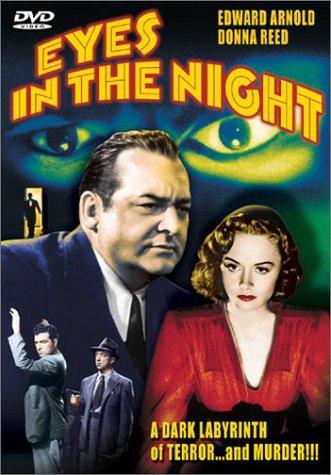IMDb meta-data is runtime of 1 hour and 20 minutes, rated 6.8 by 992 cinemtizens.
Genre: Mystery, Canine.

Verdict: A fast start and and fast finish, but in between time passed very slowly.
Veteran supporting actor Edward Arnold plays the lead as a blind detective in the first of a short-lived series of B pictures. He is ably supported by an excellent cast and it starts well.
Eddie has his Alsatian, Friday, to look after him and Allen Jenkins to do the heavy lifting in-between pratfalls, while Mantan Moreland opens and closes doors and his bug eyes. These latter two share the comic distress duties.
An old (girl) friend (hereinafter designated OGF) comes to ask for his help, because her step-daughter Donna Reed (sigh…, went the fraternity brothers) is in love with a gigolo twice her age. What Eddie and company can do about this domestic tangle is anyone’s guess. He tells her to have it out with Gigolo.
OGF takes his advice. (What a sucker, cried the fraternity brothers.) She finds Gigolo cold and dead on the bear rug in front of the fireplace in his bachelor pad. Gulp! She goes back to Eddie, who sets out with Friday and Jenkins for reasons unknown, but a private dick has to do what a private dick has to do, per the script.
OGF’s husband is the incredibly dignified Reginald Denny, a scientist working on a TOP SECRET project that he keeps in his clothes closet at home. Security or what? Or what. He is away being important leaving OGF and Donna at home to tear strips off of each other with a houseful of recently employed servants with foreign accents. Will the clothes closet b safe? The tension did not mount.
So far it has some pace and mystery, but about now occurs a hissing sound that is the air leaving the balloon.
All of the many servants at the house are Nazi spies so incompetent they have not yet found the closet and purloined Reggie’s secret. Donna’s friends who encourage her to antagonise her step-mother, i.e., OGF, are also Nazis. They are everywhere. Friday even looks under the bed for more. The top Nasty is Katherine Emery who gives a masterful performance as a black widow.
Once Eddie is ensconced in the house, the action freezes. He carries on as best he can with the screenplay but really…. He plays the organ; he paces in garden; he listens at doors; he plays the organ some more; he paces in the garden; he listens at doors. Then for a change he repeats the sequence. It was a very long night. And so on.
[It is no surprise to any observer of the absurdity of life, that some IMDb reviewers think the interminable scenes at the house with Eddie playing the uncle are great. Me, watching paint dry would be better.]
The Nasties take him for a fool, underestimating him because he is blind. That is a neat idea but it just does not gel in this rendering. He has some nice lines like this one: ‘Turn out the lights, I am going to read.’ Did he have a Kindle, too? No, he had Braille.
There is a superb confrontation in a darkened cellar where the blind man has the edge, and it is staged and directed with real suspense. Fortunately for the Eddie the Nasties have been knocking each other off to reduce the budget so he does not have to deal all of them at once. Meanwhile Friday shows off his canine athletic ability racing here and there, completing a crossword puzzle on the run. It all comes good in The End.
A second was made but it, too, had a cool reception, perhaps there were too many blind men coming home for the war for it to be diverting. There is a large ensemble cast on show here and many went on to bigger and better things, including Rosemary de Camp, John Emery, Ann Harding, Steven Geray, Stephen McNally, and Barry Nelson in addition to those named above.
But the biggest name is director Fred Zinnemann whose list of subsequent credits runs to: ’Member of the Wedding’ (1952), ‘High Noon’ (1952), ‘From Here to Eternity’ (1953), ‘A Hatful of Rain’ (1957), ‘Behold a Pale Horse’ (1964), ‘A Man for All Seasons’ (1966), and more.
Skip to content
